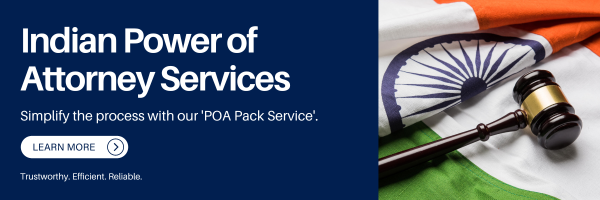For NRIs or OCIs living in different parts of the world, it is not practical to travel to India frequently to manage the properties they own or to handle financial or legal transactions that require their physical appearance in India. This is where a General Power of Attorney proves to be useful. A General Power of Attorney (GPA) legally allows an NRI or OCI based outside of India, such as in the UK or Canada, to empower their relatives or friends in India to represent them or to conduct legal formalities on their behalf. Despite being convenient, power of attorney does have its disadvantages and one must be aware of the pros and cons of this legally binding arrangement.
Advantages of an Indian Power of Attorney
Some advantages of an Indian Power of Attorney are
- When a parent or loved one decides to sign an NRI GPA, it is a good opportunity for the parent to discuss wishes and expectations with the family.
- An NRI GPA will save on the time and money spent travelling to and fro from India. In situations where personal presence is required more than once in a short period, the OCI individual will be compelled to free up a significant amount of time to attend to the situation. Sometimes, this is difficult when one is in full-time employment abroad.
- Seeking the assistance of a local relative to handle legal formalities on your behalf will be more convenient as they will be more familiar with the local laws and requirements.
- An NRI GPA can be beneficial when an NRI/OCI individual cannot travel due to old age or ill health (not mentally incapacitated).
- An NRI GPA can give peace of mind and satisfaction to elderly individuals, that they can handle their property or financial transactions as per their wishes during their lifetime.

Risks of giving an Indian Power of Attorney
Some disadvantages of the Indian Power of Attorneys are
- One major risk of an NRI GPA is the attorney may act in ways or do things that the principal had not intended. For this reason, it is important to be fully aware of the powers being granted and aware of your attorney’s actions.
- Where there is no direct supervision of the attorney’s activities by anyone other than you, the grantor of the NRI GPA, this may increase the risk of situations such as elder financial abuse and/or fraud. In which case you must seek professional legal advice.
- With the above-mentioned potential for abuse or fraud in mind, many Indian authorities and/or third parties, such as the revenue department or banks, may not accept a General Power of Attorney if it is not drafted correctly. And the only remedy would be to start the entire process again.
- The attorney cannot carry out certain transactions if an NRI GPA is not drafted correctly. If an attorney cannot act on behalf of the grantor due to insufficient GPA, the only remedy is to either draft the GPA correctly or the grantor will have to travel to carry out those formalities themself.
As an NRI or OCI person empowering another person to act on your behalf, you must understand that this should be handled with great care. It is always advisable to give a power of attorney when necessary, as the actions and powers specified under an NRI GPA are legally binding on the grantor.
How can we help
For expert advice and assistance regarding your NRI General Power of Attorney, contact our professional legal team on 02087575751 or complete our enquiry form.
Related links:
- Power of Attorney Pack Service
- Sending a Power of Attorney from the UK to India
- The Real Cost of of an NRI Power of Attorney
- Top 5 NRI Power of Attorney mistakes to avoid
- Pros and Cons of an NRI General Power of Attorney
- Power of Attorney Guide for Non-Resident Indians
Frequently asked questions
A General Power of Attorney should contain details such as particulars of the grantor, attorney and property and the description of all the relevant powers to be given. The POA must be signed in the presence of two witnesses and their details must also be included in the document. The document should be clear and concise as to the nature and extent of powers being given.
Yes, you can sell a property in India by appointing a proxy to act on your behalf in your absence (through a Power of Attorney). The proxy should be a trustworthy individual as they will be handling your property/financial affairs for you.
For India, you will have to create an Indian Power of Attorney. This document will have to undergo certain legal formalities in order to be considered valid under Indian Law.






